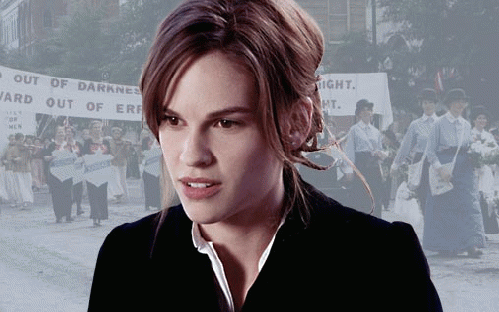REVIEW: Iron Jawed Angels
Director Katja von Garnier
HBO 2004, 123 minutes
Airing thru June 27, 2008
Starring Hillary Swank (Alice Paul), Frances O'Connor (Lucy Burns), Julia Ormond (Inez Mulholland), Angelica Huston (Carrie Chapman Catt), Frances O'Connor (Lucy Burns), Brooke Smith (Mabel Vernon), Molly Parker (Emily Leighton), Vera Farmiga (Ruza Wenclawska), Laura Fraser (Doris Stevens), and Lois Smith (Anna Howard Shaw).
With a potent title like that, this film had to be worth the watch. As I settled in, to my delight I realized it was about the latter day suffragists (1914-1920). Iron Jawed Angels recreates the tenor and passion of the decade before the 19th Amendment was passed, focusing on the charismatic and radical leader, Alice Paul (Swank).
A Brief Herstory of Voting
Women voted in most of the American Colonies, except in four that specifically excluded them. In New Jersey, woman suffrage lasted from 1664 to 1807, and in Massachusetts from 1691-1780. As with men, restrictions applied but were not uniformly enforced. Indisputably, more restrictions applied to women than to men. [1]
In the heady days after defeating the English in 1783, States frantically rewrote their laws specifically disenfranchising women. By 1807, all states had rescinded their right to vote. What was good for the gander was apparently not good for the goose.
In 1792, Mary Wollstonecraft wrote her seminal book, A Vindication of the Rights of Woman, which inspired the American woman suffrage movement. Later leaders organized a national conference in 1848 and began winning back the franchise, state by state. Starting in 1869 in Wyoming, and 1870 in Utah, American women again enjoyed the franchise.
In the 71 years following the Seneca Falls Convention, Western states yielded to suffragist demands. Prior to passage of the 19th Amendment to the US Constitution in 1919, women voted in 26 states, but only in federal elections in 12 of them.
Iron Jawed Angels takes a tiny slice of this history, focusing on 1914-1920. Using the internecine conflicts over money and strategy as the backdrop, it highlights the lives of several key figures: Alice Paul and Lucy Burns, primarily, along with their cohorts, Inez Mulholland, Molly Parker, Doris Stevens, and Mabel Vernon.
The National Women's Party formed to force the issue of suffrage in a single national Constitutional Amendment, breaking from Carrie Chapman Catt's state-by-state campaign (organized thru the National American Woman Suffrage Association - NAWSA). Iron Jawed Angels does not present Catt in a positive light, but Angelica Huston adeptly portrays the haughty character with perfection.
Executive Producer Lydia Dean Pilcher wrote of the film:
There was a quote I read many years ago: 'freedom is the sound of opinions clashing.' And I think that's something we've gotten very far away from in our country, that hopefully our film will help inspire that kind of lively debate, people stepping up and being passionate.
That historic passion is captured – on both sides of the debate. The film exposes the hypocrisy of "spreading democracy over there" as the US entered World War I, when a great bulk of its own citizenry lacked the franchise. Angels also exposes the private and institutional violence perpetrated against women for demanding the vote.
(Note: You can view every article as one long page if you sign up as an Advocate Member, or higher).





